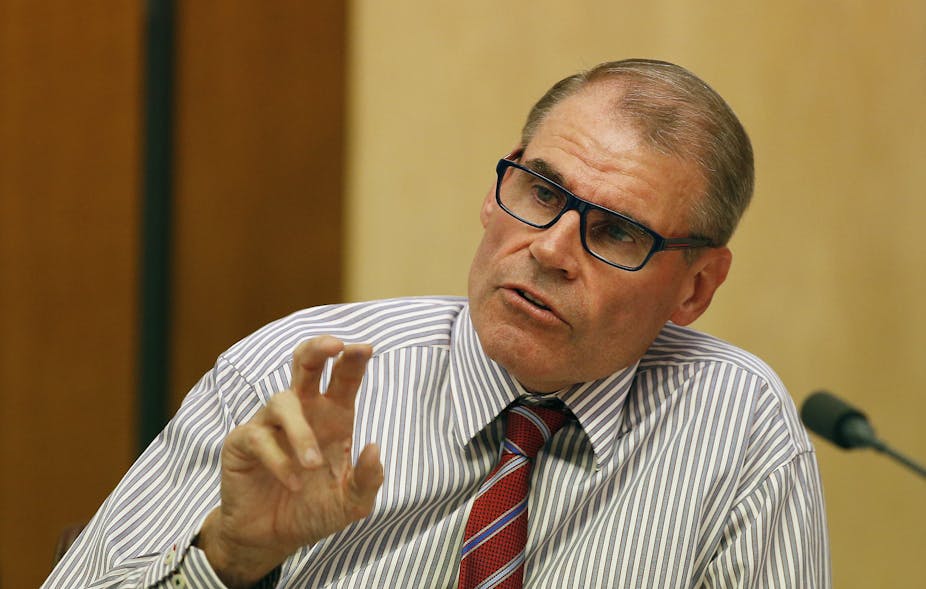Labor Party guru senator John Faulkner has called on the NSW ALP to “front up and apologise” for the corruption that has tainted state politics – and to embrace reforms to prevent it ever happening again.
In a tough speech ahead of the weekend state conference in which he will fight for rule changes, Faulkner said the NSW party “must take responsibility for the rotten practices and systemic failures that in the public mind have come to symbolise our party in NSW”.
The NSW right-wing machine has backed Faulkner’s proposal to write a commitment to integrity into the rules. But his push for Senate and state upper house candidates to be chosen by the rank and file – rather than by the factions with the state conference ratifying the choices – is doomed before it is even debated, with the right faction opposing it. The left supports the move, but left members will not be bound.
Former NSW ALP general secretary Sam Dastyari, from the right, now a senator, told The Conversation: “Reform shouldn’t be at the expense of our traditions, of weakening the conference, and of our relationship with the trade union movement.”
The conference is expected to endorse giving the party members a 50-50 say in electing the state leader, as operates federally.
Opposition leader Bill Shorten has called on his party to embrace changes to make it more open and inclusive. But he faces an uphill struggle, in the run-up to next year’s national conference, to get reforms that are more than token.
Faulkner ran though a list of corrupt figures, including former state MLCs Eddie Obeid, Ian Macdonald and Tony Kelly, former federal MP Craig Thomson (on whom the party had spent more than $348,000 for his legal bills) and former ALP national president Michael Williamson.
“We have to take steps to stop corruption in our party happening again – the only way to do that is to change the mechanisms that allowed these corrupt individuals to prosper.”
But the response to all this was “no substantive change in the party rules. Just business as usual.
"I do favour change, and let’s start with those who represent us in parliament. I say open up the upper house preselection process,” said Faulkner, addressing the launch of the NSW group of Local Labor, a body devoted to party renewal and empowering the membership.
The weekend conference will endorse the Senate ticket for the 2016 election, including a replacement for Faulkner who has announced he will not recontest. It will also approve NSW upper house candidates.
The preselection ballot to be held at the conference was a “fix”, Faulkner said. The candidates chosen by the factions had already been reported in the media.
“The conference ballot will be window dressing. Everyone knows it is a rubber stamp.
"I say, end the farce. Let’s have a real ballot, not just contested by the small number of people who have won factional endorsement,” he said.
“We should aspire to the best possible candidates selected through the best possible process. Instead, we have at times produced the worst candidates through a profoundly flawed system.”
A full membership ballot might not be the perfect solution, “but it is incomparably better than what we have now”, Faulkner said.
“I have much, much more faith and confidence in the membership of the party to preselect upper house candidates than I do in the factional machines, particularly given their abysmal record.”
Faulkner said the recommendations of the inquiry conducted after the 2010 federal election, of which he was a member, had been largely ignored.
Labor must re-establish its standing as a party of reform, “pursuing its goal of a better and fairer Australia”, he said. “We must reject any attempt to use focus groups or research to influence or decide the direction of party policy.”
The membership needed to grow, but declining membership had followed a declining say for members.
“We cannot expect members to join or remain in the Labor Party if they have no meaningful role or say in it – including in candidate selection, and the policy and direction of the party,” he said.
“We must open up the party, reach out to supporters, include them in the development of our party and encourage their more active involvement in it.
"We should broaden our policy processes to allow more voices to be heard, and we should involve party supporters in candidate selection in local areas.” Trials of “community preselections” (or primaries) had worked – “let’s have more of them”.
Faulkner, who for many years was a major factional power broker on the left, said factions had often played a positive role.
“But factional interests must never be placed above party interests. Unfortunately in recent years putting factional interests first is standard operating procedure. We need a new culture of inclusion that always puts the party’s interests and its future above that of any faction or sub-faction.”

